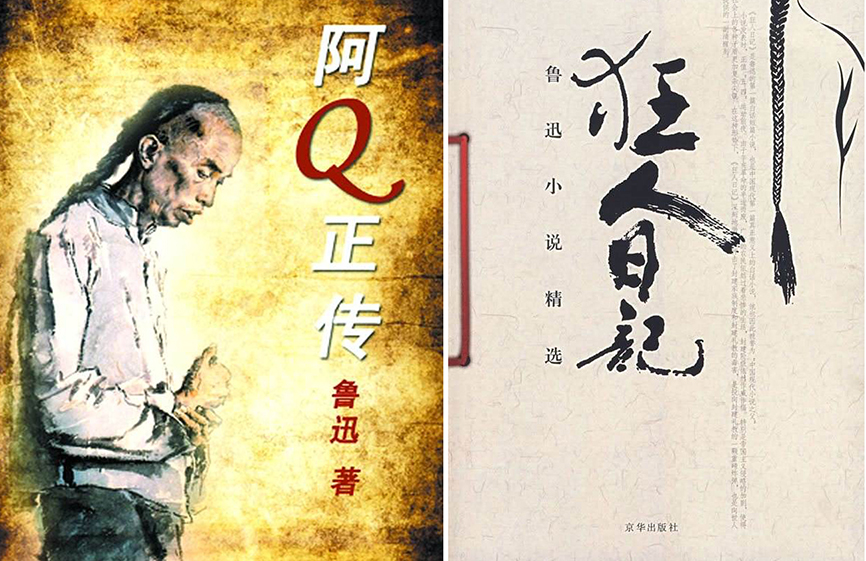Forum proposes literary culturology

The True Story of Ah Q and A Madman’s Diary, notable novels written by Lu Xun (1881-1936) who was one of the major Chinese writers of the 20th century Photo: FILE
The first National High-end Forum on Literary and Cultural Studies was recently held in Jinan, Shandong Province. Topics relating to the connotations of literature and culture drew great attention at the forum.
Ever since China’s reform and opening-up, literary studies in China have embraced far-reaching development trends. Meanwhile, literature and culture continue to interact and influence each other as integral and important parts of contemporary Chinese society and culture.
Wang Susheng, a professor of literature from Shanxi Normal University, suggested that any kind of literary expression is rooted in a specific cultural context. That is to say, literature expresses aspects of the culture that fostered it. Meanwhile, every cultural expression is also set in a specific established discourse which demonstrates, more or less, a certain cultural concept. For literature to address current challenges, a culture-focused method of dissemination and explanation should be established, Wang said. An explanation of literature from the perspective of culturology will bring about the innovative development of literature, he said.
Tu Keguo, director of the Institute of Cultural Studies at the Shandong Academy of Social Sciences, said that despite having its own relatively independent position and unique values, literature always inevitably communicates and fuses with all kinds of expressions of culture. Furthermore, the development of literature and other literary elements cannot be achieved without interaction with other expressions of culture. Meanwhile, literature also, in many ways, affects other cultural traits. For example, the May 4th Movement in 1919 started with a literary revolution, he added.
In the face of the impacts of secularization and the development of networks, literature demonstrates diversification and multi-polarization. It also faces problems relating to fragmentation and marginalization. Participants at the forum reached a consensus that conducting literary studies from the perspective of culturology will integrate disparate cultural modalities and forge a collective literary force that is interconnected and mutually complementary, thusbetter addressing all kinds of challenges facing literature.
Literature is closely related to places, and the geography and customs in different regions profoundly affect literary creation. Hence, regional culture is an important reference for observing literature. Tu suggests that increased attention should be paid to the connection between regional culture and regional literature. Literary studies already show a cultural turn. Literary studies and cultural studies are gradually becoming integrated, he said.
Chen Fulong, an associate professor from Shandong Normal University, said that authors from different regions are naturally associated with the distinctive natural, social and cultural environment where they were nurtured. The cultural mentality of these authors cannot be separated from the cultural background where they live. For example, he suggested that Lu Xun was deeply influenced by the Wu and Yue cultures. The Wu and Yue cultures became the positive elements of Lu’s literary works, his personality and his deep cultural psychology, which affected him his entire life.
Wen Fengqiao, a professor of communication from the Ocean University of China, suggested that in modern times, regional literature forms an important type of Chinese literature, significantly broadening the aesthetic realm of Chinese literature. Authors are profoundly affected by regional culture in terms of cultural memory, feelings and aesthetic tastes. Regional literary studies are basically studies from cultural perspectives, broadening the domain of contemporary literary studies and enriching its models and methods, he said.
Zhang Wei, a research fellow from the Institute of Cultural Studies at the Shandong Academy of Social Sciences, said the combination of literature with culture provides an entirely new perspective and method for analyzing literary works. It not only helps demonstrate the rich theory of literary studies, but also helps solve its traditional problems.
Considering the complex interactive relationship between culture and literature, participants at the forum suggested speeding up the establishing of a discipline known as literary culturology. Tu suggested this discipline should observe literary culture from the general cultural system, examine the rise and decline as well as the historical evolution of literary culture, and analyze the historical position and cultural role which literature plays in the entire cultural structure.
(edited by CHEN ALONG)
